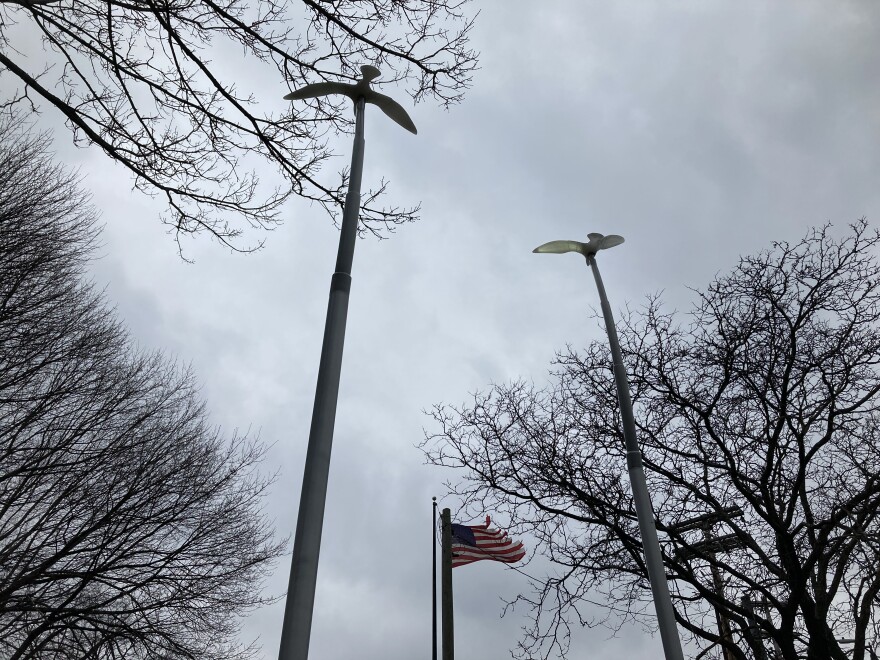BINGHAMTON, NY (WSKG) — On April 3, 2009, 13 people were killed in a mass shooting at the American Civic Association in Binghamton.
Parveen Ali, Almir Olimpio Alves, Marc and Maria Bernard, Li Guo, Lan Ho, Layla Khalil, Roberta King, Jiang Ling. Hong Xiu “Amy” Mao Marsland, Dolores Yigal, Hai Hong Zhong, and Maria Zobniw.
"Our hearts and prayers go out to the victims and their families," said ACA Board President Angela Leach following the attack. "Whatever drove this individual to do what he did, I cannot possibly fathom. But we will come out of our grief and sadness more resolute in our mission, and more dedicated than ever to help people realize the dream of American citizenship."
The association is a resource center for people migrating to the U.S.—offering English and citizenship classes, clinics on legal counsel, and other immigrant services.
Mayra Garcia, Executive Director of the Binghamton ACA, remembered support came from area elected officials and the surrounding community. She started working there two months after the shooting, when they still did not have access to their building.
"We were very grateful to have the church next door that had allowed us to use the basement to see clients individually and to continue the process of immigration," said Garcia.
Twelve years later the organization remains resolved in its mission and dedicated to remembering the people killed that day.
Healing A Community
There are many ways the shooting could have fractured the community.
When a traumatic event impacts an entire community, grieving can happen independently and as a unit. Without effective communication and remedial action the community can suffer acute damage to morale.
"Usually these events are something that nobody is prepared for," said Melissa Glaser, author of the book Healing a Community: Lessons Learned Following a Large Scale Trauma. "Even the leaders in the community aren't prepared."
Glaser was tasked with managing the emotional health of the town after the shooting at Sandy Hook Elementary School in Newtown, Connecticut in 2012. 20 children and six educators were killed in that shooting.
According to Glaser, one of the first things to breakdown is trust. That is especially true if the person who committed the murders is a member of the affected community, but people with good intentions can inadvertently compound grief.
For instance, the media is often quickly on the scene.
"It’s understandable that the world wants to know about these situations, but often it's so soon," Glaser said. She explained the people are vulnerable and may regret an interview after, which can sow distrust and anger.
Money donated for victims’ families or recovery funds from state and federal governments can cause suspicion about where it goes and who is most deserving.
Trust is also lost when helpers make promises they cannot fulfill or if lawmakers talk of policy change that never comes to fruition. Glaser recalls after the shooting at Sandy Hook, then President Obama promised gun reform which still has not happened.
Collective grieving can offer unique support.
"The positives can be that communities learn—on both an individual and then maybe a small group or collective way—to reach out to each other and to be there for each other. They can learn how to listen. They can learn how to educate," Glaser explained the people of the community can educate themselves about how the survivors or families of those killed are feeling, the impact of their trauma.
Glaser said people should not wait for those most closely impacted be the ones to give the education. Meet people where they are in their grief, ask questions and don’t be afraid of the answers.
Helping Each Other Make Sense Of Life
"We will come out of our grief and sadness more resolute in our mission." That message from Angela Leach is true.
The ACA continues to provide immigration services, and act as a cultural hub, hosting regular dinners and the annual Garlic Festival, for people moving to the area to meet each other and other Binghamton residents.
During years not impacted by the COVID-19 pandemic, the organization would hold a memorial service, open to the public, which offers healing prayers from various religions. If they have moved away, families of people killed that day have come back to town.
“They still have the passion in their hearts to be here,” said Valentina Bernardo, whose parents died in the attack. “They don’t want to forget. Instead of forgetting, they honor this day and make it something special,” she said, while speaking at the ninth anniversary.
"We still live with it, you know. It is not easy," Samir Khalil said the following year. His wife, Layla, was among those killed.
Garcia said working at the ACA so soon after the shooting was a challenge, but she felt purpose in her mission and a duty to remember the people who died.
"We can never forget what happened here in this small community," Garcia explained, but she also has a goal to put the trauma behind the organization. She said people still feel afraid to go into the building because they remember what happened.
Garcia also called the trauma "an awakening", not to take life for granted.
"We are all human and we have to help each other, understand each other, and try to make sense of life."
Mass shootings have impacted so many spaces of our lives—the grocery store, schools, parks. Melissa Glaser said she is disturbed by recent mass shootings in Georgia and Colorado, but fears society is becoming desensitized to the act. Since WSKG last spoke to Glaser, another mass shooting occurred in Southern California.
Glaser said she's worried society moves on too quickly after a mass shooting, but we are all responsible for helping each other heal.





